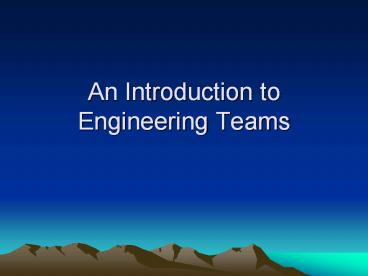An%20Introduction%20to%20Engineering%20Teams - PowerPoint PPT Presentation
Title:
An%20Introduction%20to%20Engineering%20Teams
Description:
An Introduction to Engineering Teams – PowerPoint PPT presentation
Number of Views:105
Avg rating:3.0/5.0
Title: An%20Introduction%20to%20Engineering%20Teams
1
An Introduction to Engineering Teams
2
Referencing
- Some of the material used in this lecture has
been obtained from the websites listed. - You should thus refer to the website for more
details and to review the context in which the
materials was presented. - Quotation marks indicated that the material has
been extracted from the website.
3
Team Definition
- What is meant by the terms team or
engineering team? - Take 2 minutes, working with the person
alongside you, to define what is meant by the
term engineering team.
4
Typical Definitions
- A team could be defined as a group of people
working towards achieving a common goal. - An engineering team could be defined as a
group of engineers with complementary skills
typically multi-disciplinary - committed to a
common purpose and who are mutually accountable
for the outcomes.
5
Reasons to Have Teams
- Engineers work mostly in teams so teams must
be good. - Your turn again - take 5 minutes, working with
the person on your other side this time, to make
a list of at least 5 reasons why engineering
teams are good.
6
A Typical List of Good Points
- Provision of Leadership.
- Sharing of responsibility.
- Increased skills base.
- Sharing of work load.
- Direction of skills to need area.
- Synergisms.
- A shared purpose.
- Well considered decisions
7
Reasons Not to Have Teams
- Some very poor engineering designs have been
attributed to teams. So engineering teams cannot
always be good. - Your turn again - take 5 minutes, working with
however you want, to make a list of at least 5
reasons why teams are not always good.
8
A Typical Not Good List
- Social loafing.
- Mismanagement.
- Ineffectiveness.
- Lack of talent.
- Lack of purpose - ill defined roles.
- Credit poaching.
- Conflict.
- Longer time for decisions.
9
Team Selection A warning
- A team of students had four members called
Everybody, Somebody, Anybody and Nobody. There
was an important job to be done. Everybody was
sure that Somebody would do it. Anybody could
have done it, but Nobody did it. Somebody got
angry about that because it was Everybodys job.
Everybody thought Anybody could do it but Nobody
realized that Everybody wouldnt do it. It ended
up that Everybody blamed Somebody when Nobody did
what Anybody could have done. - (Gibbs, 1995) - from http//www.samford.edu/pbl/
10
Characteristics of Effective Team
Membershttp//www.nsbe.org/region1/crm/admin/effe
ctiveteams.doc
- Is energetic
- Is skilled at resolving conflict
- Is well organized
- Has experience as a group leader
- Is respected by group members
- Is reliable
- Is charismatic
- Is intelligent
- Is creative
- Possesses a sense of humor
- Is effective in achieving results
- Works for consensus on decisions
- Understands whats going on in the group
- Does not engage in win/lose activities, use a
win-win approach.
- Shares openly and authentically with others.
- Involves others in decision process
- Trusts, supports other team members
- Owns problems rather than blaming others in the
team. - Listens, attempts to hear and interpret
communication from others view - Influences others by involving them.
- Encourages the development of other team members
- Respects and is tolerant of individual
differences - Acknowledges and works through conflict openly
- Considers and uses new ideas and suggestions from
others - Encourages feedback on own behavior
- Understands the team role - committed to team
objectives
11
Team Development and Performancehttp//lowery.tam
u.edu/Teaming/Morgan1/sld015.htm
As you move through a project your team may
follow the team development curve shown
here. Many engineering teams do not go past, or
even reach, the real team stage.































